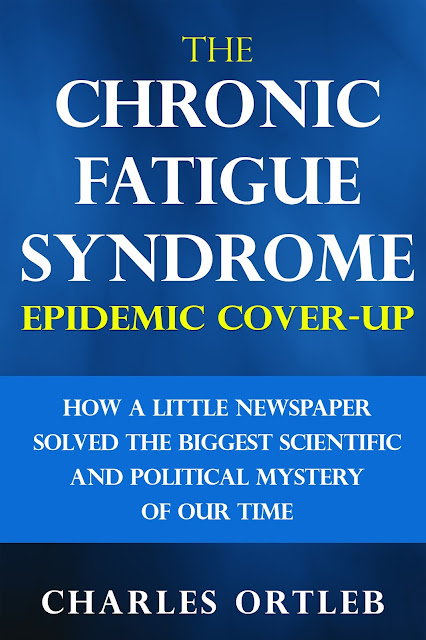If the CDC had called AIDS "HHV-6 Disease" Chronic Fatigue Syndrome would not still be a mystery and there would be a treatment.
Dharam Ablashi on HHV-6:
"HHV-6 is actually likely to reduce HIV patient survival by accelerating the depletion of CD4 and CD8 T cells. HHV-6A was shown to accelerate AIDS progression in macaques. Macaques co-infected with simian HIV and HHV-6A died quickly and showed a dramatic depletion in both CD4+ and CD8+ T cells, whereas those infected with only simian HIV never progressed to full blown AIDS."
"We believe that infections are the most logical explanation for the inflammation neurodegeneration associated with Alzheimer’s, but don’t believe that there is a single pathogen responsible. HHV-6A and HHV-7 were identified as likely culprits in 2018 paper, using RNAseq analysis by Readhead and team. Two subsequent studies did not find an increase in HHV-6/7 using the same data, but at the same time did not find a significant presence of ANY herpesviruses in the brain, which we know is not the case. Dozens of careful studies have identified a high prevalence of low-level HHV-6 and HSV1 DNA in brain tissues. This tells us that RNAseq and ddPCR methods employed to date are not sufficiently sensitive to really answer the question of whether these viruses play a role in Alzheimer’s. Future studies should be done with both extremely sensitive assay as well as multiple samples from each brain region to answer the question of HHV-6A/B prevalence in Alzheimer’s samples vs. controls. In 2002, Ruth Itzhaki’s group looked for HHV-6 and HSV1 by nested PCR and found HHV-6 DNA in 70% of Alzheimer’s brains vs. 40% of controls. They found HSV1 at high levels in both AD patients and controls. Old-fashioned nested PCR is time-consuming and complicated because measures must be taken to prevent contamination, but this old-school technique may still be a better approach than newer techniques (such as RNAseq analyses) that can find little to no herpesvirus in these brains. The other issue is that infections may be early triggering events that disappear over time. It will take a lot of time and a solid investment in research to find any answers."
"We don’t think ME/CFS is triggered by a single pathogen; we believe it can be triggered by a number of intracellular pathogens including enterovirus, parvovirus B-19, mycoplasma pneumonia, chlamydia pneumonia, EBV, Cytomegalovirus (CMV), and HHV-6A/B and HHV-7. After the Dan Peterson and Paul Cheney first discovered HHV-6 in patients with the outbreak of ME/CFS in Incline Village Nevada in the 1980s, Dan Peterson, Anthony Komaroff, and Deidra Buchwald came to see Dr. Gallo to discuss whether HHV-6 played a role in ME/CFS. At their request, we tested the antibodies of sera or plasma from ME/CFS patients. During this process we found a subset of samples with very high antibody titers to HHV-6. Buchwald, Komaroff, and associates published a paper in 1992 that found used primary cell culture to determine that 70% of ME/CFS patients but only 20% of controls showed signs of active replication. Later in 2001, I published another paper that showed an increased level of IgM antibodies to an HHV-6 early antigen protein in ME/CFS patients. This was an assay based on a reagent produced at Gary Pearson’s lab at Georgetown, and unfortunately, this reagent is no longer available. Recently Dr. Bhupesh Prusty in Germany has shown how persistent HHV-6 infection can cause mitochondrial dysfunction, which may play a role in ME/CFS. Also, Dr. Kondo recently published very interesting data showing that a neurovirulent HHV6 latency protein plays a pathogenic role in both depression and fatigue. He previously determined that HHV-6 builds up in the saliva when the body is fatigued and says this virus finds its way to the nasal passages and then on to the olfactory bulb and brain. A latency protein he calls SITH-1 then causes hyperactivation of the HPA axis and subsequent depression and fatigue."
Source:
http://microbeminded.com/2020/06/28/interview-with-dharam-ablashi-on-the-discovery-of-hhv6-and-its-involvement-in-chronic-inflammatory-disease/
"HHV-6 is actually likely to reduce HIV patient survival by accelerating the depletion of CD4 and CD8 T cells. HHV-6A was shown to accelerate AIDS progression in macaques. Macaques co-infected with simian HIV and HHV-6A died quickly and showed a dramatic depletion in both CD4+ and CD8+ T cells, whereas those infected with only simian HIV never progressed to full blown AIDS."
"We believe that infections are the most logical explanation for the inflammation neurodegeneration associated with Alzheimer’s, but don’t believe that there is a single pathogen responsible. HHV-6A and HHV-7 were identified as likely culprits in 2018 paper, using RNAseq analysis by Readhead and team. Two subsequent studies did not find an increase in HHV-6/7 using the same data, but at the same time did not find a significant presence of ANY herpesviruses in the brain, which we know is not the case. Dozens of careful studies have identified a high prevalence of low-level HHV-6 and HSV1 DNA in brain tissues. This tells us that RNAseq and ddPCR methods employed to date are not sufficiently sensitive to really answer the question of whether these viruses play a role in Alzheimer’s. Future studies should be done with both extremely sensitive assay as well as multiple samples from each brain region to answer the question of HHV-6A/B prevalence in Alzheimer’s samples vs. controls. In 2002, Ruth Itzhaki’s group looked for HHV-6 and HSV1 by nested PCR and found HHV-6 DNA in 70% of Alzheimer’s brains vs. 40% of controls. They found HSV1 at high levels in both AD patients and controls. Old-fashioned nested PCR is time-consuming and complicated because measures must be taken to prevent contamination, but this old-school technique may still be a better approach than newer techniques (such as RNAseq analyses) that can find little to no herpesvirus in these brains. The other issue is that infections may be early triggering events that disappear over time. It will take a lot of time and a solid investment in research to find any answers."
"We don’t think ME/CFS is triggered by a single pathogen; we believe it can be triggered by a number of intracellular pathogens including enterovirus, parvovirus B-19, mycoplasma pneumonia, chlamydia pneumonia, EBV, Cytomegalovirus (CMV), and HHV-6A/B and HHV-7. After the Dan Peterson and Paul Cheney first discovered HHV-6 in patients with the outbreak of ME/CFS in Incline Village Nevada in the 1980s, Dan Peterson, Anthony Komaroff, and Deidra Buchwald came to see Dr. Gallo to discuss whether HHV-6 played a role in ME/CFS. At their request, we tested the antibodies of sera or plasma from ME/CFS patients. During this process we found a subset of samples with very high antibody titers to HHV-6. Buchwald, Komaroff, and associates published a paper in 1992 that found used primary cell culture to determine that 70% of ME/CFS patients but only 20% of controls showed signs of active replication. Later in 2001, I published another paper that showed an increased level of IgM antibodies to an HHV-6 early antigen protein in ME/CFS patients. This was an assay based on a reagent produced at Gary Pearson’s lab at Georgetown, and unfortunately, this reagent is no longer available. Recently Dr. Bhupesh Prusty in Germany has shown how persistent HHV-6 infection can cause mitochondrial dysfunction, which may play a role in ME/CFS. Also, Dr. Kondo recently published very interesting data showing that a neurovirulent HHV6 latency protein plays a pathogenic role in both depression and fatigue. He previously determined that HHV-6 builds up in the saliva when the body is fatigued and says this virus finds its way to the nasal passages and then on to the olfactory bulb and brain. A latency protein he calls SITH-1 then causes hyperactivation of the HPA axis and subsequent depression and fatigue."
Source:
http://microbeminded.com/2020/06/28/interview-with-dharam-ablashi-on-the-discovery-of-hhv6-and-its-involvement-in-chronic-inflammatory-disease/
















